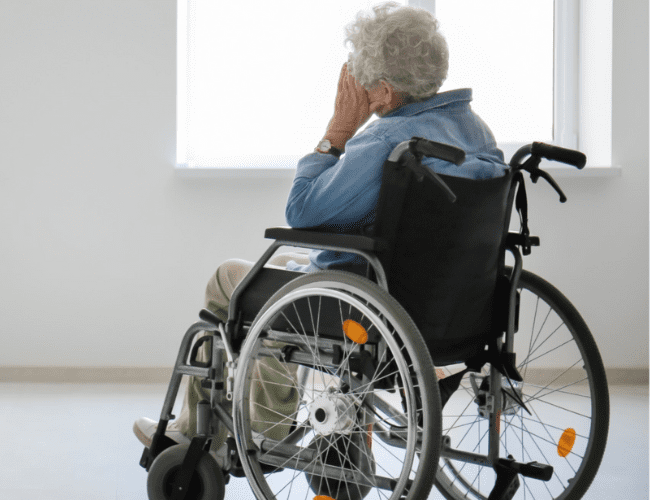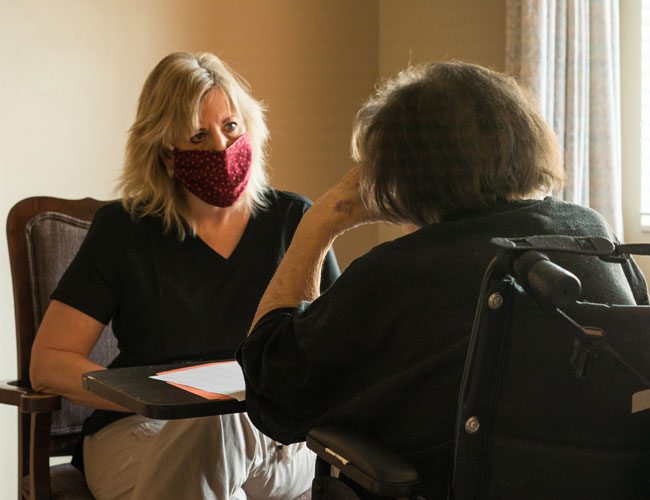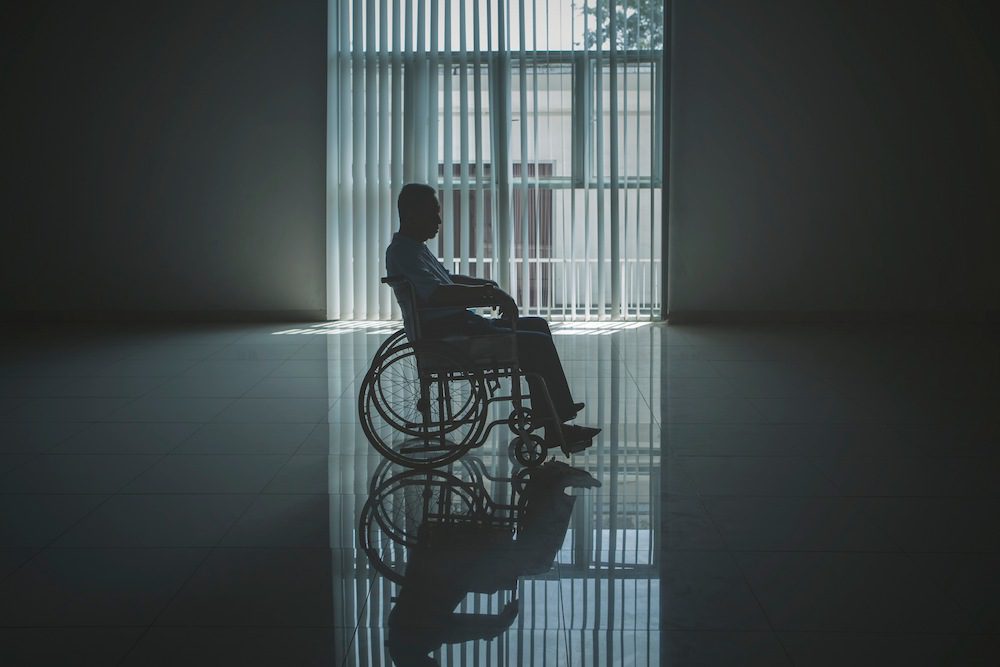What Is an Example of Neglect in a Nursing Home?
Identifying potential signs of nursing home abuse and neglect is crucial. Common signs of nursing home neglect and abuse can include bedsores or decubitus ulcers, indications of malnutrition or dehydration, improper medication dosage (either too much or too little), sepsis or infections, failure to deliver requested medical care, instances of wandering or elopement, misuse of restraints (physical or chemical), unexplained bruises or injuries, and sudden and unexplained death.
It's important to also be attentive to changes in behavior, like mood swings or withdrawal, as well as abrupt shifts in the financial situation of your loved one, which might suggest exploitation by caregivers. Detecting these signs early can be vital in protecting your loved ones from harm.
Why Should I Consult With a Nursing Home Abuse Attorney?
Consulting with a nursing home abuse and neglect attorney is crucial to protect your loved one's rights and seek justice. Nursing home negligence cases can be legally complex and emotionally challenging. An experienced attorney who understands the intricacies of elder law can guide you through the legal process, negotiate with relevant parties on your behalf, and pursue fair compensation for medical bills, emotional damages, and other losses caused by abuse or neglect.
At Cohen, Feeley, Altemose & Rambo, we become your trusted advocates, helping you navigate the legal landscape while you focus on your loved one's well-being. Our knowledge and experience are invaluable in securing the compensation and justice your family deserves.
How Can Cohen, Feeley, Altemose & Rambo Help With Nursing Home Abuse and Neglect Cases?
At Cohen, Feeley, Altemose & Rambo, we're committed to being the guiding light in nursing home abuse and neglect cases. Our legal team possesses decades of experience and a deep understanding of the complexities involved. We can assist you in preparing and filing your lawsuit, gathering crucial evidence, and constructing a compelling case. Whether through negotiation or litigation, we tirelessly fight for the justice your loved one deserves.
Why Should I Choose Cohen, Feeley, Altemose & Rambo for My Nursing Home Abuse and Neglect Case?
Choosing Cohen, Feeley, Altemose & Rambo means selecting a team with a genuine passion for justice. We view nursing home abuse and neglect as a particularly egregious offense against the most vulnerable. Our relentless representation has resulted in a
remarkable track record, including over half a billion dollars in settlements for our clients, the highest verdict of $95 million, and 25+ years of specialized experience in nursing home abuse and neglect cases. When you choose us, you're choosing unwavering advocacy for your loved one.
How Can I Get Started With Cohen, Feeley, Altemose & Rambo for My Nursing Home Abuse Case?
Getting started is easy. Give us a call or fill out our
online form to schedule your free, no-obligation consultation with our nursing home abuse and neglect attorneys in Allentown.
We’re happy to discuss the details of your case and review any documentation you have. We may also ask some questions to help us better understand your case. Let us be your strong advocates, fighting to protect your loved one's rights and seeking the justice they deserve.
When Should You Contact a Nursing Home Abuse and Neglect Lawyer?
It’s important to contact a nursing home abuse and neglect lawyer in Allentown as soon as you begin suspecting abuse. Don’t wait until it’s too late.
A nursing home abuse lawyer can help guide you toward the type of documentation and evidence you’ll need and give you advice on how to secure the evidence. The earlier you work with an attorney, the better your chances are of building a strong case and holding the nursing home responsible.
We are committed to both serving and educating our community on how to recognize elder abuse and what to do about it. Take a look through our
latest blogs to learn more about the options that are available to you.
How Serious of a Problem Is Elder Abuse in Nursing Homes?
Elder abuse in nursing homes is a deeply concerning issue, and our mission is to address it head-on. While it's difficult to ascertain the exact prevalence due to underreporting, available statistics are distressing. The World Health Organization estimates that one in six people over 60 experienced abuse in a community setting in a 12-month period. In the U.S., approximately one in 10 elders is believed to experience abuse, but only one in 14 cases is reported. These figures underscore the gravity of the problem, making our dedication to combating it even more crucial.
What Are the Causes of Nursing Home Abuse or Neglect?
Nursing home abuse or neglect can stem from various factors, including understaffing, inadequate training, subpar hiring practices, and poor facility management. Vulnerability among nursing home residents, many of whom have limited mobility and medical dependencies, can also contribute. Regrettably, some individuals with malicious intent may target these vulnerable populations, viewing them as easier victims for exploitation. Identifying and addressing these root causes is pivotal in preventing such abuse and neglect in nursing homes.
What Are the Different Types of Elder Abuse and Neglect?
Elder abuse and neglect can take various forms, all of which are deeply concerning. Actions may include physical abuse, emotional or psychological abuse, isolation, withholding of medication or treatment, sexual abuse, financial exploitation, abandonment, and neglect of basic needs such as food, hygiene, and medical care. Each of these forms of mistreatment can cause significant harm to vulnerable individuals and demands swift action to address.
What Signs of Elder Abuse/Neglect Should You Look For?
Being vigilant for signs of elder abuse and neglect is crucial. Look for physical signs like unexplained injuries or weight loss, as well as signs of inadequate hygiene, infections, or frequent illnesses. Changes in temperament, such as mood swings or withdrawal, can also indicate abuse. Pay attention to the behavior of caregivers for signs of callousness. Any abrupt changes in a loved one's financial situation might suggest exploitation by nursing home caregivers.
What Kinds of Nursing Home Abuse and Neglect Cases Do We Handle?
At Cohen, Feeley, Altemose & Rambo, our team of
personal injury attorneys handle a wide range of nursing home abuse and neglect cases. Our goal is to secure damages for pain and suffering, as well as reimbursement for medical expenses for victims of abuse and neglect. We are dedicated to advocating for those who have suffered harm at the hands of negligent caregivers and facilities.
How Can You Prevent Your Loved One From Becoming a Victim of Nursing Home Abuse or Neglect?
Prevention involves vigilance on behalf of your loved one. Carefully research nursing homes for their reputation, hiring practices, and resident treatment history. Frequent visits, both scheduled and unannounced, can help you monitor your loved one's well-being once in the nursing home. Be cautious of any restrictions placed on your visitation rights that you do not fully understand. Watch for telltale signs of abuse, such as physical injuries, pressure sores, weight loss, malnourishment, and mood changes.
Additionally, keep a close eye on your loved one’s finances if you have access to them. Be wary of any large withdrawals, suspicious payments or purchases, or new accounts opened in their name.
What Should You Do if You Suspect Abuse or See Your Loved One Being Abused?
Discovering that a loved one may be facing abuse or neglect in a nursing home is a distressing situation. Your prompt and informed actions can make a significant difference in ensuring their safety and well-being:
Document the Evidence: Collect all relevant documentation and evidence that supports your suspicions. This can include photographs of any injuries or unsanitary conditions, medical records, and any pertinent witness statements.
Report to the Nursing Home: Initially, report your concerns to the nursing home's administrative team. They may genuinely want to address the issue and correct it, especially if the incident was isolated and the result of a rogue caregiver rather than institutional negligence. Make sure to document all of your communications with the nursing home.
Contact Pennsylvania Authorities and/or Law Enforcement: If the situation is not adequately addressed by the nursing home's management, or if immediate intervention is necessary, don't hesitate to reach out to the Pennsylvania Department of Health, Department of Aging, or even local law enforcement. They have the authority to investigate potential abuse or neglect.
Seek Legal Counsel: Contact an experienced elder abuse attorney, such as Cohen, Feeley, Altemose & Rambo. Our experienced legal team can offer invaluable guidance to protect your loved one's rights and ensure that justice is served. We provide free consultations to help you understand your legal options, so don't hesitate to reach out for assistance.
Ensure Your Loved One's Safety: In cases of immediate danger, try to ensure the safety of your loved one, including by relocating them to another facility or more secure environment if possible. Their well-being is always top-priority.
Foster Open Communication: Maintain open and frequent communication with your loved one. Reassure them of your support and involve them in any decisions regarding their care and legal actions as much as possible.
Remember, acting swiftly and decisively is essential when elder abuse is suspected. It is a grave matter that requires immediate attention, both in terms of ensuring your loved one's safety and preserving crucial evidence. We are here to assist you every step of the way, starting with a free consultation to discuss your specific situation and legal options.
How Does the Law Protect Nursing Home Residents From Abuse?
There are legal provisions and regulations in place to address the unique vulnerabilities of elderly adults living in long-term care facilities like nursing homes, and to try to ensure their health and well-being. Here's a breakdown of how the law offers protection:
State and Federal Regulations: Nursing homes in the United States are subject to both state and federal regulations. The Federal Nursing Home Reform Act of 1987 sets forth specific requirements for the care of nursing home residents and establishes a Resident's Bill of Rights. This federal law is implemented through state agencies, ensuring a baseline level of care and protection nationwide, with Pennsylvania specifically governed by the Older Adults Protective Services Act (OAPSA) in addition to federal regulations.
Resident's Bill of Rights: The Resident's Bill of Rights outlined in Section 483.10 of the Code of Federal Regulations (42 CFR § 483.10) is a cornerstone of nursing home regulation. It outlines the fundamental rights of nursing home residents, including the right to dignity, privacy, and respect. It also includes the right to be free from abuse, neglect, and exploitation. Residents have the right to make decisions about their care, be informed about their medical conditions, and have access to their medical records.
Regulatory Agencies: State health departments, often in conjunction with federal agencies like the Centers for Medicare & Medicaid Services (CMS), oversee nursing home compliance with regulations. These agencies conduct inspections, investigate complaints, and enforce penalties for violations.
Specifically, the Pennsylvania Department of Health inspects all nursing homes every year and requires nursing home staff to complete training programs and pass a background check.
Reporting and Investigation of Abuse: Nursing homes are required to report any suspected or alleged abuse or neglect promptly. Regulatory agencies investigate these reports and take appropriate action, which can include fines, facility closures, and criminal charges.
Public Reporting: Nursing home inspection results, including any violations, are often publicly reported and can be accessed by consumers. This transparency promotes accountability and helps families make informed decisions about care.
Right to Legal Action: Nursing home residents or their legal representatives have the right to take legal action against facilities or individuals responsible for abuse or neglect. Legal actions can include civil lawsuits to seek compensation for damages and criminal charges against perpetrators.
Ombudsman Programs: Many states have Long-Term Care Ombudsman programs, which are independent advocates for nursing home residents. They can help residents and their families resolve complaints, understand their rights, and navigate the legal system.
What Kind of Compensation Can I Seek in an Elder Abuse Lawsuit?
Victims of elder abuse or their families can seek several types of compensation, depending on the nature of the abuse. The potential compensation may include:
Medical Expenses: Your loved one may seek reimbursement for current and future medical bills related to the treatment of injuries caused by abuse.
Pain and Suffering: Compensation may include an amount for the emotional and physical suffering endured due to the abuse or neglect.
Mental Anguish: Compensation for the psychological impact of the abuse, such as depression, fear, or humiliation.
Relocation Costs: If your loved one needs to be moved to another facility due to abuse, you may recover the costs of relocation.
Punitive Damages: Punitive damages may be awarded to punish the wrongdoer and discourage future abuse.
Wrongful Death Damages: If elder abuse results in a wrongful death, the family may seek compensation for funeral and burial costs.
Financial Compensation for Exploitation: If the elder was a victim of financial abuse, compensation may cover lost assets, funds, or property.
What Are the Standards of Care Required by Law of Nursing Homes?
Nursing homes are legally required to uphold specific standards of care to ensure the well-being of residents. The Federal Nursing Home Reform Act of 1987 established a Resident’s Bill of Rights for residents living in long-term care facilities. Some of the key rights outlined in the Act include:
- The right to be free from abuse, neglect, and exploitation.
- The right to privacy and confidentiality of personal and medical information.
- The right to participate in one's own care and treatment decisions.
- The right to be treated with dignity and respect.
- The right to voice grievances without fear of retaliation.
- The right to have a choice in activities, schedules, and healthcare providers.
- The right to be free from unnecessary restraints.
- The right to access one's own medical records.
- The right to participate in family groups.
- The right to be fully informed about one's health status, treatment, and medications.
The Federal Nursing Home Reform Act provides a framework for protecting the well-being and dignity of nursing home residents in facilities that receive federal funding through Medicare and Medicaid.
Are There Any Laws to Protect Senior Citizens in Pennsylvania?
Pennsylvania’s Department of Aging is responsible for the implementation of the Older Adults Protective Services Act (OAPSA), which applies to individuals over the age of 60. OAPSA mandates that certain individuals, known as mandatory reporters (including healthcare professionals, social service workers, and law enforcement), report suspected abuse, neglect, exploitation, or abandonment of older adults. The Act requires thorough investigations and provides legal protections and immunity from civil and criminal liability to individuals who make good faith reports of suspected abuse or neglect. This encourages reporting without fear of retaliation.
Additionally, OAPSA establishes a framework for providing protective services to older adults who are at risk of abuse or neglect, including medical assessments, counseling, legal assistance, and other forms of support to address harmful situations.
Why Don’t the Elderly Report Abuse, and What Can You Do About It?
Elderly individuals may be reluctant to report abuse or neglect due to various reasons, including fear of retaliation, embarrassment, cognitive impairments, or communication limitations. To address this, it's essential to:
- Foster open communication with your loved ones, reassuring them of your support.
- Educate them about their rights and the resources available to them.
- Advocate on their behalf and monitor their well-being regularly.
- Report any suspicions of abuse or neglect promptly to the appropriate authorities.
- Seek legal counsel from experienced elder abuse attorneys like Cohen, Feeley, Altemose & Rambo to protect their rights and well-being.
When Is It Appropriate to Sue a Nursing Home for Abuse and Neglect?
If you suspect that a nursing home is not living up to its duties, it may be appropriate to investigate and file suit. A nursing home that fails to provide its residents with a safe, clean living environment, free of abuse and neglect, and where their basic personal and medical needs are met, is subject to a lawsuit for such failures if they cause a resident harm.
Who Can Bring a Lawsuit for Elder Abuse or Neglect?
Most lawsuits are officially brought by the victim and their families. If the victim is not able to take action, a family member may serve as an appointed legal guardian or conservator. If the victim is deceased, their Estate becomes the plaintiff.
How Do I Report Nursing Home Neglect in PA?
If you suspect nursing home abuse or neglect, it is crucial to act quickly and efficiently to protect the well-being and legal rights of the affected individual. As a law firm specializing in elder law, we advise you to follow these steps:
- Compile Detailed Documentation: Carefully collect all relevant documents that support your suspicions of abuse or neglect. This can include medical records, photographs of injuries or unsanitary conditions, and pertinent witness statements.
- Formal Reporting to the Nursing Home's Management: Submit a formal, written report outlining your concerns to the nursing home's administrative team. Ensure that you retain copies of all communication, and request a formal acknowledgment of your submitted report for your records.
- Contact Appropriate Government Agencies: If the situation is not adequately addressed by the nursing home's management, or if immediate intervention is necessary, reach out to the Department of Health or Adult Protective Services and/or local law enforcement agencies.
- Seek Legal Consultation: Schedule a free, no-obligation consultation with the experienced legal team at Cohen, Feeley, Altemose & Rambo. With over 25 years of experience in nursing home neglect cases, our team will work tirelessly to ensure your loved one receives just recompense for their suffering.








